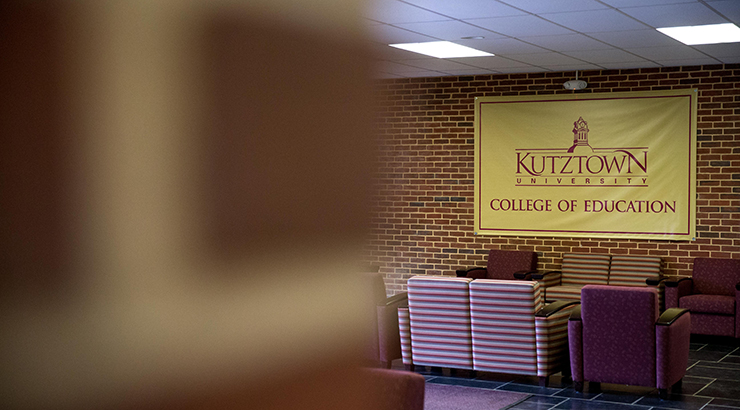Professor Receives NSF Grant to Provide Scholarships for Diverse STEM Teacher Candidates

KUTZTOWN, Pa. – Kutztown University's Dr. Mark Wolfmeyer, department chair, secondary education, was awarded a five-year, $1.2 million grant from the National Science Foundation (NSF). The grant (NSF-2150692) will support the recruitment of more STEM professionals to careers in secondary STEM teaching, drawing from a wider diversity of demographic, disciplinary and professional experience and to prepare them for the challenging task of STEM education in under-resourced urban communities.
The project, Mentoring Urban STEM Teachers (MUST) for Equity and Innovation, aims to serve the national need to increase the diversity of students entering STEM professions by supporting and training a broader diversity of secondary STEM teachers to teach those students. This project will recruit post-baccalaureate STEM professionals, drawn from a wide diversity of demographic, disciplinary and professional backgrounds, to careers in secondary STEM teaching and will prepare them for the challenging task of serving as STEM educators in under-resourced urban communities. A synergistic collaboration among university faculty, secondary-school educators and community partners will train candidate teachers in development of the pedagogical and cultural knowledge needed for effective teaching in underserved communities and will provide sustained mentorship to the new teachers as they implement that knowledge in the classroom.
KU professors involved in the grant include Wolfmeyer (PI), Dr. Yun Lu (Co-PI), Dr. Ju Zhou (Co-PI), Dr. Amber Pabon (Co-PI) and Dr. Richard Heineman (Co-PI).
The 12-month program concludes with a student earning a master's degree and teacher's license. Accepted applicants receive a stipend award of $27,900, which covers the cost of in-state tuition and helps to offset living expenses during the student teaching experience. KU is currently accepting applications for the Master of Education program as well as the Noyce scholarship for new teacher candidates with an application deadline of April 15. The program starts at the end of May.
Based at Kutztown University, the project includes partnerships between the KU Colleges of Education and College of Liberal Arts and Sciences, the Reading and Allentown School Districts and community partners to achieve the following goals over the five-year period:
- Support the academic training of 25 STEM professionals as secondary STEM teachers through a one-year M.Ed. degree program (with initial teaching certification).
- Increase the demographic diversity of STEM teachers.
- Prepare STEM educators capable of implementing culturally relevant approaches to STEM teaching, through a community-based co-curricular program and sustained mentorship of student teachers by KU education and STEM faculty that continues through the first two years of post-degree teaching.
A research project will assess the impact of three elements of the proposed program on both student teachers and faculty members:
- The impact of STEM-faculty mentoring and an annual pedagogy content knowledge (PCK) workshop on implementation of PCK by Robert Noyce Teacher Scholarship Program (Noyce) scholars in the STEM classroom.
- The impact of KU education faculty mentoring and planned co-curricular experiences on implementation of culturally relevant pedagogy (CRP) in the classroom.
- The impact of mentoring Noyce scholars on PCK and CRP on the KU STEM and education faculty themselves.
Broader impacts of this project include an increase in the number and diversity of secondary STEM teachers and increased diversity of the young mathematicians and scientists trained by those teachers. It also is expected that the project will have synergistic effects on all members of the local teaching community by creating a shared understanding, among both university and secondary educators, of the teaching challenges faced by current STEM teachers and by teachers in training. Dissemination of project outcomes at regional and national conferences and in STEM and education-focused publications will further broaden the project's impact.
KU Noyce Program – Eligibility and Selection Process
As a National Science Foundation Noyce Scholarship program, KU's MUST for Equity and Innovation provides $27,900 stipends for five STEM teacher candidates per year (2022-2027) who are enrolled full time in KU's graduate level secondary education with initial certificate program. The stipend covers tuition ($22,500) and includes additional money to offset program and living expenses. Following graduation is a two-year service requirement to teach STEM in a high needs school district.
KU's M.Ed. in Secondary Education: Teaching with Initial Certification Program
Potential teacher candidates for the KU Noyce program must apply and be accepted to this master's program. This program provides teacher certification and a master's degree in 12 months and prioritizes equity for urban public education. Applicants must have completed prior content area coursework for the subject matter they plan to teach; the program's courses cover pedagogical theory and practice and include student teaching in the final spring semester. Full program details can be found here.
M.Ed. program entrance requirements (full details on website):
- Apply online through KU's Office of Graduate Admissions.
- Official transcripts from all previous university coursework.
- Background checks (clearances).
- Demonstrate content knowledge Pass Praxis examination for certificate area.
- Participate in interview with program faculty.
MUST for Equity and Innovation (Noyce scholarship)
Eligible candidates for MUST for Equity and Innovation are accepted STEM teacher candidates in the master's program who have a bachelor's degree in a STEM major and who are planning to teach a STEM content area. They must be a United States citizen, nationals or permanent resident alien. To apply for the Noyce scholarship, send an email to Noyce@kutztown.edu with a brief essay explaining academic and professional experience to date and reasons for interest in a STEM teaching career. A follow-up interview will be scheduled with some of the program's faculty.
Selection criteria: In seeking students with the potential to excel as secondary school STEM teachers, we will consider the following criteria:
- Academic merit or other evidence for strong competence in STEM.
- Potential to add to the diversity of the Noyce-scholar cohort.
- Evidence of teaching potential.
Visit the website for more information or contact Wolfmeyer at noyce@kutztown.edu.






